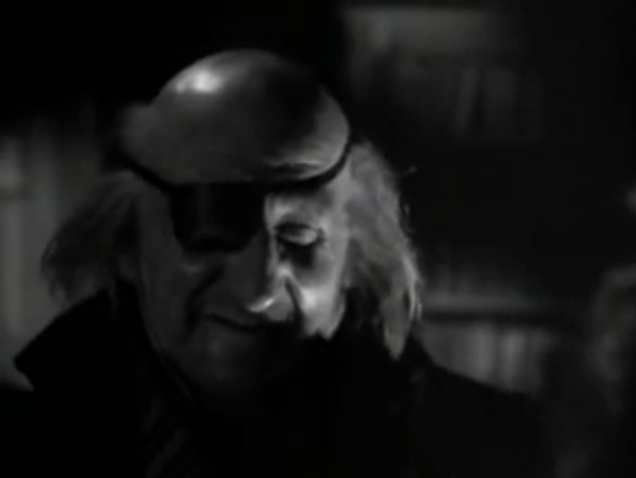Best Scene: Sam and Tony in the prison cell.
4. Anthony Wong in Beast Cops - Wong gives an entertaining and sometimes moving portrayal of a lazy corrupt cop who tries to redeem himself.
Best Scene: Tung attempts his redemption.
3. Jeff Bridges in The Big Lebowski - Bridges gives an enjoyable performance as both a funny slacker but as well a straight man in the role he was apparently born to play.
Best Scene: The two Lebowskies meet.
2. Ian McKellen in Apt Pupil - McKellen's film is terrible as the film's direction stays in one direction while the writing goes in a completely different way. McKellen though matches the two opposing sides with his performance. The first side giving a chilling portrayal of an evil man given the chance to reflect on his evil deeds. The second being an entertaining portrayal of an evil Nazi. McKellen stays above the film by taking his own path apart from the film.
Best Scene: Dussander visits Todd's family.
Best Scene: Cahill and the Inspector's last meeting.
Overall Ranking:
- Brendan Gleeson in The General
- Ian McKellen in Apt Pupil
- Edward Norton in American History X
- Jeff Bridges in The Big Lebowski
- Ian McKellen in Gods and Monsters
- Anthony Wong in Beast Cops
- Tony Leung Chiu Wai in The Longest Nite
- Rufus Sewell in Dark City
- Jim Carrey in The Truman Show
- Tom Hanks in Saving Private Ryan
- Lau Ching Wan in The Longest Nite
- Nick Nolte in Affliction
- Bill Paxton in A Simple Plan
- Jason Schwartzman in Rushmore
- Johnny Depp in Fear and Loathing in Las Vegas
- Bill Pullman in Zero Effect
- John Travolta in A Civil Action
- Anthony Hopkins in The Mask of Zorro
- Samuel L. Jackson in The Negotiator
- Matt Damon in Rounders
- Antonio Banderas in The Mask of Zorro
- Kevin Spacey in The Negotiator
- Mel Gibson in Lethal Weapon 4
- Will Smith in Enemy of the State
- George Clooney in Out of Sight
- Liam Neeson in Les Miserables
- Danny Glover in Lethal Weapon 4
- Geoffrey Rush in Les Miserables
- Adam Sandler in The Wedding Singer
- Trey Parker in Baseketball
- Tony Ho in The Longest Summer
- Wesley Snipes in Blade
- Anthony Hopkins in Meet Joe Black
- Chris Tucker in Rush Hour
- Tommy Lee Jones in U.S. Marshals
- Ian Bannen in Waking Ned Devine
- Joseph Mazzello in Simon Birch
- Woody Allen in Antz
- John Travolta in Primary Colors
- Ian Michael Smith in Simon Birch
- Patrick Stewart in Star Trek Insurrection
- Ben Stiller in There's Something About Mary
- Denzel Washington in The Siege
- Val Kilmer in The Prince of Egypt
- Matt Stone in Baseketball
- Matt Dillon in Wild Things
- Dave Foley in A Bug's Life
- Jackie Chan in Rush Hour
- Wesley Snipes in U.S. Marshals
- Adrian Lester in Primary Colors
- Eddie Murphy in Doctor Dolittle
- Brendan Fraser in Gods and Monsters
- Leslie Nielsen in Wrongfully Accused
- Ralph Fiennes in The Avengers
- Joseph Fiennes in Shakespeare in Love
- Warren Beatty in Bulworth
- Elijah Wood in The Faculty
- Bruce Willis in Armageddon
- Harrison Ford in Six Days Seven Nights
- Elijah Wood in Deep Impact
- Jared Leto in Urban Legend
- Michael Keaton in Jack Frost
- Robin Williams in Patch Adams
- Nicolas Cage in City of Angels
- Gregory Smith in Small Soldiers
- Tobey Maguire in Pleasantville
- James Marsden in Disturbing Behavior
- Brad Pitt in Meet Joe Black
- Bill Paxton in Mighty Joe Young
- Norm MacDonald in Dirty Work
- William Hurt in Lost in Space
- Ben Affleck in Armageddon
- Leonardo DiCaprio in The Man in the Iron Mask
- Eddie Murphy in Holy Man
- Michael Wong in Beast Cops
- Scott Bakula in Major League: Back to the Minors
- Jay Mohr in Jane Austen's Mafia
- Adam Sandler in The Waterboy
- Jay Mohr in Paulie
- Matthew Broderick in Godzilla
- Brad Renfro in Apt Pupil
- Vince Vaughn in Psycho




































